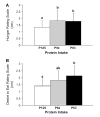Inadequate dietary protein increases hunger and desire to eat in younger and older men
- PMID: 17513410
- PMCID: PMC2259459
- DOI: 10.1093/jn/137.6.1478
Inadequate dietary protein increases hunger and desire to eat in younger and older men
Abstract
Many older people experience changes in appetite and consume marginal or inadequate dietary protein. This study was designed to examine the appetitive responses to habitual protein intakes that span the range of adequacy in younger and older men. Twenty-two men (12 younger, aged 21-43 y and 10 older, aged 63-79 y) completed, in random order, three 18-d trials that involved consumption of individualized, isoenergetic menus providing 1.00, 0.75, and 0.50 g protein . kg BW(-1). d(-1), which were 125% (trial P125), 94% (trial P94), and 63% (trial P63) of the Recommended Dietary Allowance for protein. Near the end of each trial, the subjects recorded appetitive sensations hourly throughout one day using a visual analogue scale. Independent of age, ratings of hunger were lower for P125 (1.3 +/- 0.5 cm) than P94 (1.8 +/- 0.8 cm) and P63 (1.8 +/- 0.6 cm) (P = 0.037), and desire to eat was lower during the P125 trial (1.4 +/- 0.5 cm), compared with the P63 trial (2.1 +/- 0.7 cm) (P = 0.003), and P94 (1.8 +/- 0.7 cm) was not different when compared with P63 and P125. Protein intake did not influence fullness. These results show that younger and older men who consume inadequate protein experience appetite changes that may promote increased food intake.
Conflict of interest statement
Author disclosures: J. W. Apolzan, N. S. Carnell, R. D. Mattes, and W. W. Campbell, no conflicts of interest.
Figures

References
-
- Booth DA, Chase A, Campbell AT. Relative effectiveness of protein in the late stages of appetite suppression in man. Physiol Behav. 1970;5:1299–302. - PubMed
-
- Hill AJ, Blundell JE. Macronutrients and satiety: the effects of a high-protein or high-carbohydrate meal on subjective motivation to eat and food preferences. Nutr Behav. 1986;3:133–44.
-
- Vandewater K, Vickers Z. Higher-protein foods produce greater sensory-specific satiety. Physiol Behav. 1996;59:579–83. - PubMed
-
- Latner JD, Schwartz M. The effects of a high-carbohydrate, high-protein or balanced lunch upon later food intake and hunger ratings. Appetite. 1999;33:119–28. - PubMed
-
- Johnson J, Vickers Z. Effects of flavor and macronutrient composition of food servings on liking, hunger and subsequent intake. Appetite. 1993;21:25–39. - PubMed
Publication types
MeSH terms
Substances
Grants and funding
LinkOut - more resources
Full Text Sources
Other Literature Sources
Medical
Research Materials

